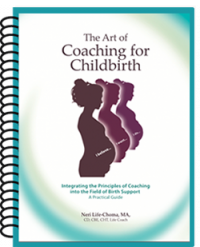
How to Identify and Remove Limiting Beliefs Relating to Birth and Postpartum?
Are you bummed or frustrated when clients’ actions don’t match the birth or postpartum vision they said they hired you for? This gap, or misalignment, is their limiting beliefs and is the #1 reason for birth givers’ undesired and unhealthy experiences. Do you know how to engage your clients in coaching conversations to identify and remove their limiting beliefs? When you don’t engage expectant clients in coaching conversations that help reveal and remove their limiting beliefs relating to their childbearing process, your satisfaction and success in your birth support practice can be significantly damaged.
Limiting beliefs are a collection of opinions of ourselves and the world, formed unconsciously based on life experiences and constraining us in some way. The stronger the beliefs, the more evidence we seem to find to support them. Birth support professionals have known for many decades that the clients we support throughout the childbearing process hold many limiting beliefs that originated in mythology, poetry, literature, and social media representations of pregnancy and birth, despite the vast majority of those being untrue. The challenge is that holding on to limiting beliefs prevents our clients from exploring options, making good choices, and taking action toward healthy and positive birth experiences. When a limiting belief remains unconscious, it may sabotage a childbirth experience that otherwise could have been completely healthy and positive.
Limting beleifs around the childbearing process
Learning to coach expectant and new parents to identify and remove their limiting beliefs profoundly impacts individuals’ self-worth, confidence, and personal empowerment throughout their childbearing process.
A gap between clients’ goals – what they tell you they want, and their actions, signals the presence of a limiting belief
Some examples of common limiting beliefs expectant individuals may hold are:
- Pregnancy and childbirth will damage my body and my sexuality
- Childbirth is too painful, and I can’t cope with it.
- Childbirth is deathly dangerous to my baby and me.
- I must choose between natural healthy birth and taking an epidural.
- Breastfeeding will restrict me and control my life 24/7; it’s not for me.
How to identify the presence of a limiting belief?
You rarely hear clients declare these beliefs, right? But it’s crucial to your client’s success that you reveal and address them. Therefore, when Transformational Birth Support Coaches lead expectant and new parents in a series of coaching conversations, we sometimes recognize a gap between clients’ goals – what they tell us they want and their actions toward achieving them. This gap alerts us to a limiting belief that hinders our client’s ability to take action and pursue their desired experience. For example, a client hires you to support them in having a natural birth, but they won’t enroll in a childbirth education class and choose to stick with a provider that is not supportive of their goal. You can assume the presence of a limiting belief that holds them back from fully committing to their vision. Limiting beliefs are tied to self-doubt, and coaches identify where this doubt stems from. So, what limiting belief prevents your client from fully committing to pursuing their vision with all their heart?
There are different types of limiting beliefs. A limiting belief can result from a lack of clarity of one’s goal or doubt about the worthiness of the goal. Individuals can doubt their worthiness or their ability to achieve their goals. Doubt can also be about the possibility of this goal in the world – is it possible? Using a coaching exercise, you can help your client identify the limiting belief holding them from taking steps to achieve their goal. Using the example above, your client might be doubting the worthiness of her commitment to natural birth or her ability to achieve it.
These masterful coaching conversations are at the core of a new framework I’ve developed for birth support. They have been the missing link in our field for a long time.
How to remove a limiting belief?
After placing the source of the self-doubt, the next step is to help your client explore how this limiting belief serves them, if at all, and adopt a new perspective that will serve them better. By introducing a set of coaching questions, you can help remove a limiting belief and create an opening to adopting a new one that serves your client better. For example, if you identified that your client doubts her ability to give birth naturally without medical interventions, you may ask:
- What images come to mind when you think about yourself as lacking this ability?
- How does it make you feel when you think about your inability to achieve your goal?
- Is it true? Is it really true? Based on past experiences, can you know it is true?
- What are the benefits of you holding on to this belief? How does it serve you?
- What is the cost? How does it alter who you are? How does it affect your behaviors, attitudes, and ability to achieve your desired experience?
- Can you see a reason to drop this belief?
- Can you try to turn the belief around and make it into a positive thought that serves your goal? For example, if your belief says: “I’m unable to go through natural birth, what would be a positive belief around your ability to achieve it?
- What’s true about this new stand?
- If you lived this new thought, how would that feel?
- If you lived this new thought, what would you do differently?
- What are you willing to do to adopt this new truth and follow it with your actions?
These masterful coaching conversations are at the core of a new framework I’ve developed for birth support. They have been the missing link in our field for a long time. As a result, birth support professionals struggle to experience success and satisfaction with the outcomes of their hard work, and their clients struggle to perform well and actualize their desired experiences. Leading these powerful and result-oriented conversations is my proven formula for empowering expectant and new parents in my practice. I’ve been sharing it with many students over the past five years. If you’re excited about the possibility of becoming a Transformational Birth Support Coach, I’d love for you to join Birth Coach Method’s global community.
Photo by Oscar Keys on Unsplash
- Overshadowing the Transformative Essence of Childbirth with Data - July 10, 2024
- Navigating the Epidural Dilemma - May 28, 2024
- Informed Decision in Birth Support: A Myth of Empowerment? - April 29, 2024


